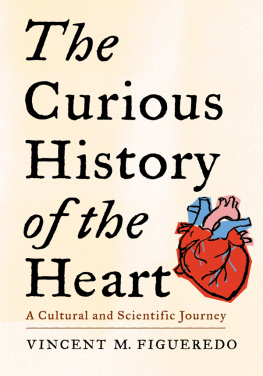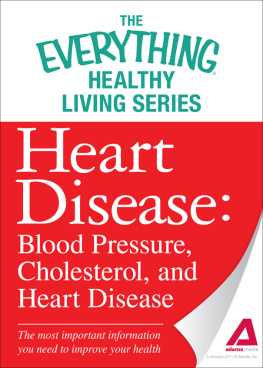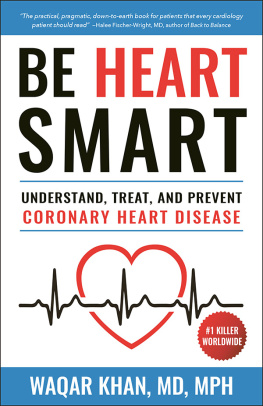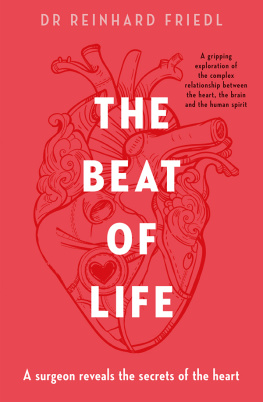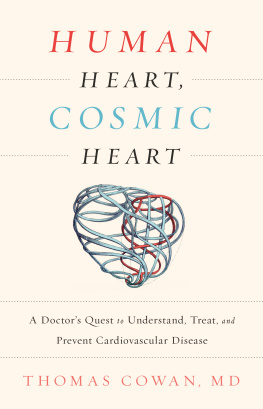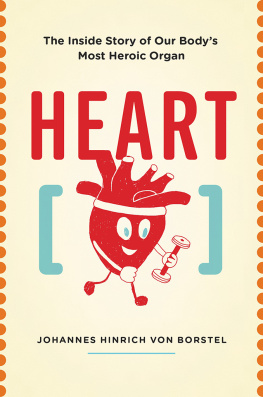Table of Contents
THE CURIOUS HISTORY OF THE HEART
The Curious History of the Heart
A Cultural and Scientific Journey
Vincent M. Figueredo
Columbia University Press
New York
Columbia University Press
Publishers Since 1893
New YorkChichester, West Sussex
cup.columbia.edu
Copyright 2023 Vincent M. Figueredo
All rights reserved
EISBN 978-0-231-55730-6
Library of Congress Cataloging-in-Publication Data
Names: Figueredo, Vincent M., author.
Title: The curious history of the heart : a cultural and scientific
journey / Vincent M. Figueredo.
Description: New York : Columbia University Press, [2023] |
Includes bibliographical references and index.
Identifiers: LCCN 2022023161 | ISBN 9780231208185 (hardback) |
ISBN 9780231557306 (ebook)
Subjects: LCSH: HeartPopular works. | CardiologyHistory.
Classification: LCC QP111.4 .F54 2023 |
DDC 612.1/7dc23/eng/20220906
LC record available at https://lccn.loc.gov/2022023161
A Columbia University Press E-book.
CUP would be pleased to hear about your reading experience with this e-book at .
Cover design and illustration: Henry Sene Yee
To the women of Five Fig Farm:
Ann, Sarah, Isabel, and Madeline
You fill my heart with love
Contents
King Charles I of England reached forward and placed his three fingers and thumb into the gaping hole in the young noblemans left chest. The king gently touched this mans beating heart.
Does it hurt? he asked.
Not at all, said the young man.
It was 1641 CE, and Charles had heard of this miracle from his personal physician, William Harvey, who was the first to scientifically demonstrate the hearts role in the circulation of blood throughout the body. With great interest the king had asked if he could meet this young man who was the nineteen-year-old son of the Viscount of Montgomery in Ireland.
At age ten, the boy fell from a stumbling horse onto a jutting rock, which pierced and broke multiple ribs on his left side. The wound abscessed and healed, leaving a hole in the boys left chest. Nine years later, alive and well, the now famous nobleman had just returned to London after traveling the European
It is a great irony that the heartwhich throughout history has been placed at the center of human feelingis in fact numb to physical touch. From the time humans first recorded their thoughts, most civilizations believed that the heart, not the brain, was the most important organ in the body. Surely ancient humans knew that the beating in their chest signified lifebeating harder and faster with fear or desire, and upon death beating no more. For thousands of years, the Egyptians, Greeks, Chinese, and Teotihuacans of Mesoamerica elevated the heart to the position held today by the brain: as the seat of the soul, emotions, thoughts, and intelligence. Throughout history, many societies thought it was through their heart that a person connected with God; and God measured a persons chances of eternal heavenly bliss based on the virtues and sins of ones life recorded in the walls of the heart.
Harveys observation in 1641 CE that the heart acted as a circulation pump had ramifications for centuries to come. Scientists and physicians changed their beliefs about the heart, and the brain slowly took over as the director and sole repository of emotions and consciousness. Today most of us believe that our brain controls our body, including the function of the heart. The heart, weve been taught, is just a pump pushing blood around the body through a circulatory system.
Because we have come to accept the heart as nothing more than a pump, we have decided that it is morally sound to transplant the heart of one person into another. But every once in a while a case arises like that of Claire Sylvia. A former professional dancer, she underwent a heart-lung transplant, receiving a heart from eighteen-year-old Tim Lamirande, who died in a motorcycle accident. After her heart transplantation, friends remarked that Claire started walking like a man; she began craving beer and chicken nuggets, which she detested prior to her transplant. Tims family said these were his behaviors. They were not surprised that she was acting this way because she now had Tims heart inside her. This story was the subject of the 2013 movie Heart of a Stranger starring Jane Seymour, but multiple accounts of inheriting the personality traits of a donor after heart transplantation have been recorded. These stories make us wonder whether the heart is just a mechanical pump or whether emotional parts of us are contained in it and travel with it.
As a cardiologist, I regularly encounter cases in which the emotional and physiological heart show a profound connection. I have witnessed heart attacks after the sudden loss of a loved one when the patient had no prior heart disease. Other patients experienced a heart attack or sudden death after their team lost a Super Bowl or World Cup penalty shootout. I have frequently witnessed lifelong couples dying within months of each other. Despite these many cases and the millennia-old association of the heart with emotions, modern medicine seems to have dismissed this intimate connection. In this book, I recount the history explaining how this happened and reveal how modern science is now suggesting that what weve lost to history should be reconsidered.
Medical science recently has found that the heart may hold feelings and, in fact, is part of a two-way heart-brain connection. Studies suggest that the heart directs the brain as much as the brain directs the heart. New research in this area may be the beginning of a scientific shift, aligning historic and modern cultural views of the heart. The heart may no longer be viewed merely as a pump; rather, the heart may again be recognized as part of the emotional vitality that ensures our mental, spiritual, and physical health.
The heart is the first organ to react to signals from the brainthink fight or flight. When a mountain lion appears on your walk in the woods, the brain activates the sympathetic nervous system, triggering an acute response that prepares the body to stand and fight or to flee. The brain tells the heart to immediately beat faster and stronger, pushing oxygenated blood to the bodys muscles to prepare them to move. The brain is also first to receive signals from the heart. If that werent the case, we might pass out when we quickly stand. The heart and its great vessels alert the brain that blood volume and pressure are dropping, and the brain responds by activating blood vessels to constrict to prevent blood from pooling in the legs.
The emotions we register in our brain reverberate in our heart. The resulting physical sensations of seeing a new loveblushing, warmth, racing pulseare manifestations of the hearts response. It is this interdependence, this heart-brain connection, that is so vital to our health. Its what has led humans for thousands of years to place their emotions, reasoning, and very soul in this hot, pumping organ that signifies were alive. The ancient Chinese and Indians stressed that a happy heart meant a happy body and a long, healthy life. The brain was seen as a mass of cold gray pudding, nothing more than a phlegm-producing organ, and the ancient Egyptians pulled it out through the nose with a hook during the embalming process.

